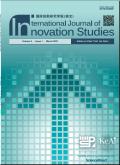Collaborative work in the implementation of Industry 4.0 technologies and its relationship with business sustainability in an emerging economy
IF 5.3
Q2 MANAGEMENT
引用次数: 0
Abstract
This study analyses the association between business sustainability and implementing Industry 4.0 through collaborative work and open innovation with stakeholders in medium and large companies in an emerging economy. The information was obtained from a sample of 165 executives from the same number of companies through a survey based on a Likert scale from 1 to 5. Data processing was conducted using the structural equation model (SEM). The results indicate that companies practice limited collaborative work with stakeholders and other societal actors to implement Industry 4.0 technologies. Despite this, there is evidence of an association between implementing these technologies and business sustainability. The results confirm the findings of previous studies in companies in developed economies, where this relationship has become an excellent strategy to address the complex and uncertain challenges faced by companies today. Likewise, the study's results provide empirical evidence for managers in emerging economies to decide how to enhance their competitive capacity. Similarly, it provides new information to those responsible for public agencies in economic issues to design and guide public policy that contributes to improving business competitiveness.
工业4.0技术实施中的协同工作及其与新兴经济体中业务可持续性的关系
本研究分析了企业可持续性与新兴经济体中大型企业利益相关者通过协同工作和开放式创新实施工业4.0之间的关系。这些信息是通过李克特量表从1到5的调查,从相同数量的公司的165名高管中获得的。数据处理采用结构方程模型(SEM)。结果表明,公司与利益相关者和其他社会参与者进行有限的合作,以实施工业4.0技术。尽管如此,有证据表明实施这些技术与业务可持续性之间存在关联。研究结果证实了之前对发达经济体公司的研究结果,在发达经济体中,这种关系已成为应对当今公司面临的复杂和不确定挑战的绝佳策略。同样,研究结果为新兴经济体的管理者决定如何提高竞争能力提供了经验证据。同样,它向负责经济问题的公共机构提供新信息,以设计和指导有助于提高商业竞争力的公共政策。
本文章由计算机程序翻译,如有差异,请以英文原文为准。
求助全文
约1分钟内获得全文
求助全文
来源期刊

International Journal of Innovation Studies
Business, Management and Accounting-Strategy and Management
CiteScore
8.10
自引率
0.00%
发文量
23
审稿时长
19 weeks
 求助内容:
求助内容: 应助结果提醒方式:
应助结果提醒方式:


